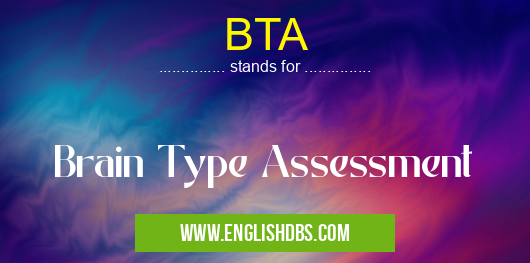What does BTA mean in UNCLASSIFIED
BTA stands for Brain Type Assessment. It is a psychometric assessment tool used to identify an individual's dominant brain type and cognitive preferences. The BTA evaluates how individuals process information, make decisions, and solve problems.

BTA meaning in Unclassified in Miscellaneous
BTA mostly used in an acronym Unclassified in Category Miscellaneous that means Brain Type Assessment
Shorthand: BTA,
Full Form: Brain Type Assessment
For more information of "Brain Type Assessment", see the section below.
Understanding the BTA
The BTA is based on the theory of neuroplasticity, which suggests that the brain can adapt and change based on experiences and training. The assessment measures four key brain types:
- Analytical (A): Focuses on logic, reasoning, and objective analysis.
- Structural (S): Prefers organization, routines, and predictability.
- Ideational (I): Values creativity, imagination, and big-picture thinking.
- Interpersonal (P): Emphasizes emotional intelligence, communication, and teamwork.
Benefits of the BTA
- Self-Awareness: The BTA provides insights into an individual's strengths and weaknesses, helping them understand their cognitive preferences.
- Career Exploration: The assessment can guide individuals towards careers that align with their dominant brain type.
- Educational Support: The BTA can help educators tailor teaching methods to meet the needs of different brain types.
- Team Building: The assessment can foster team cohesion by identifying the unique contributions of each member based on their brain type.
- Personal Growth: The BTA can help individuals develop strategies to enhance their cognitive abilities and adapt to new challenges.
Essential Questions and Answers on Brain Type Assessment in "MISCELLANEOUS»UNFILED"
What is a Brain Type Assessment (BTA)?
A BTA is a self-administered tool designed to provide insight into an individual's cognitive preferences, strengths, and areas for development.
Why should I take a BTA?
A BTA can help you identify your unique cognitive profile, optimize your learning strategies, and make informed career choices.
How does a BTA work?
BTAs typically involve completing a series of questions designed to assess your preferences, abilities, and cognitive styles in different areas, such as language, logic, and creativity.
What are the different types of brain types?
There are various brain types identified by BTAs, each with its unique characteristics and strengths. Some common types include:
- Verbal
- Analytical
- Practical
- Creative
- Social
Is a BTA scientifically valid?
The validity and reliability of BTAs vary depending on the specific assessment tool used. Some BTAs have undergone rigorous research and are widely accepted in the scientific community, while others may have limited validation.
How can I use my BTA results?
Your BTA results can provide valuable insights for:
- Identifying your preferred learning styles
- Enhancing your academic performance
- Choosing a career path that aligns with your cognitive strengths
- Developing targeted strategies for personal growth
Are BTAs suitable for everyone?
BTAs are generally appropriate for individuals aged 16 and older who are interested in understanding their cognitive preferences. However, it's important to keep in mind that these assessments are not intended to diagnose or treat any medical conditions.
Final Words: The Brain Type Assessment (BTA) is a valuable tool that provides insights into an individual's cognitive preferences. By understanding their dominant brain type, individuals can optimize their learning, career choices, and personal growth. The BTA empowers individuals to leverage their unique cognitive strengths and develop effective strategies to achieve their goals.
BTA also stands for: |
|
| All stands for BTA |
